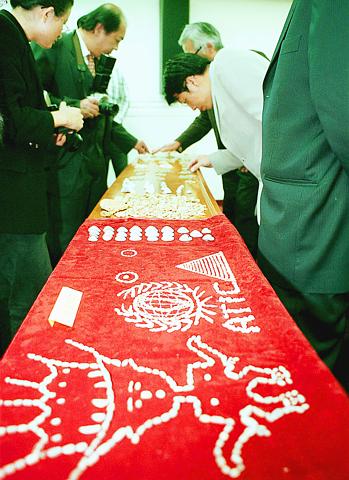An important archaeological find that could necessitate the rewriting of Taiwan's pre-historical culture records has been made at the site of the Fourth Nuclear Power Plant (核四發電廠), lawmakers and field researchers said yesterday.
DPP legislator Chang Chin-fang (張清芳) said at a press conference that a large shell mound rich in residue of silver, iron, coal and charcoal had been found at Yenliao Bay (鹽寮灣).
The excavation was done around a month ago by the Katagelan Culture Workshop, a field research group which focuses on Aboriginal pre-historical culture.

PHOTO: GEORGE TSORNG, TAIPEI TIMES N
Lin Sheng-yi (林勝義), founder of the cultural workshop, said the site was many hectares in size, and that one-third of it was within the area of the Fourth Nuclear Power Plant.
The remainder is on a site allocated for the construction of Yen-liao Park, Lin said.
Lin said Taiwan Power Corp had rejected a request by his workshop to extend excavation to the site of the Fourth Nuclear Power Plant, which is currently under construction.
The building of the power plant was approved by the legislature in 1994 against strong resistance from opposition parties and environmentalists. Ground was broken on the plant last year and it is currently 29 percent complete. It is scheduled for completion by 2005.
Lin, along with legislators, were worried that these possibly pre-historic relics might be destroyed before a scientific evaluation of the site could be conducted.
"On initial examination it is quite possible that the site was originally a processing area for precious metals thousands of years ago," Lin said.
Echoing Lin and Chang, DPP Legislator Lin Chung-mo (林重謨) said the shells unearthed seemed very similar to the ones of Sanxingtuei Culture (三星堆文化) in Sichuan (四川), China.
Sanxingtuei was first excavated in 1986, and it was immediately recognized as one of the world's ten most important archaeological discoveries. The ancient civilization centered on the Sanxingtuei site has been estimated to be 3,300 years old.
So far, there has been no complete academic research done to the relics of Yenliao Bay, but according to radiocarbon dating conducted by the NTU geology department, the shells from the site are estimated to be 3,510 years old.
The great age of the shells discovered indicates that the site needs immediate preservation for further archaeological researches legislators said.
Legislators called for research institutes to do studies on the site and said the government should set up a Taiwan pre-history cultural preservation center at the site once there is clear evidence that it is important.
Field researcher Lin said his cultural workshop have asked the Cabinet-level Council of Cultural Affairs (文建會) for support.
"Chairperson Lin Cheng-chi (林澄枝) has promised to provide support for further scientific examination to the site," he said.

MAKING WAVES: China’s maritime militia could become a nontraditional threat in war, clogging up shipping lanes to prevent US or Japanese intervention, a report said About 1,900 Chinese ships flying flags of convenience and fishing vessels that participated in China’s military exercises around Taiwan last month and in January last year have been listed for monitoring, Coast Guard Administration (CGA) Deputy Director-General Hsieh Ching-chin (謝慶欽) said yesterday. Following amendments to the Commercial Port Act (商港法) and the Law of Ships (船舶法) last month, the CGA can designate possible berthing areas or deny ports of call for vessels suspected of loitering around areas where undersea cables can be accessed, Oceans Affairs Council Minister Kuan Bi-ling (管碧玲) said. The list of suspected ships, originally 300, had risen to about

DAREDEVIL: Honnold said it had always been a dream of his to climb Taipei 101, while a Netflix producer said the skyscraper was ‘a real icon of this country’ US climber Alex Honnold yesterday took on Taiwan’s tallest building, becoming the first person to scale Taipei 101 without a rope, harness or safety net. Hundreds of spectators gathered at the base of the 101-story skyscraper to watch Honnold, 40, embark on his daredevil feat, which was also broadcast live on Netflix. Dressed in a red T-shirt and yellow custom-made climbing shoes, Honnold swiftly moved up the southeast face of the glass and steel building. At one point, he stepped onto a platform midway up to wave down at fans and onlookers who were taking photos. People watching from inside

Japan’s strategic alliance with the US would collapse if Tokyo were to turn away from a conflict in Taiwan, Japanese Prime Minister Sanae Takaichi said yesterday, but distanced herself from previous comments that suggested a possible military response in such an event. Takaichi expressed her latest views on a nationally broadcast TV program late on Monday, where an opposition party leader criticized her for igniting tensions with China with the earlier remarks. Ties between Japan and China have sunk to the worst level in years after Takaichi said in November that a hypothetical Chinese attack on Taiwan could bring about a Japanese

STREAMLINED: The dedicated funding would allow the US to transfer equipment to Taiwan when needed and order upgraded replacements for stockpiles, a source said The US House of Representatives on Thursday passed a defense appropriations bill totaling US$838.7 billion, of which US$1 billion is to be allocated to reinforcing security cooperation with Taiwan and US$150 million to replace defense articles provided to the nation. These are part of the Consolidated Appropriation Act, which the US House yesterday passed with 341 votes in favor and 88 against. The act must be passed by the US Senate before Friday next week to avoid another government shutdown. The US House Committee on Appropriations on Monday unveiled the act, saying that it allocates US$1 billion for the Taiwan Security Cooperation Initiative